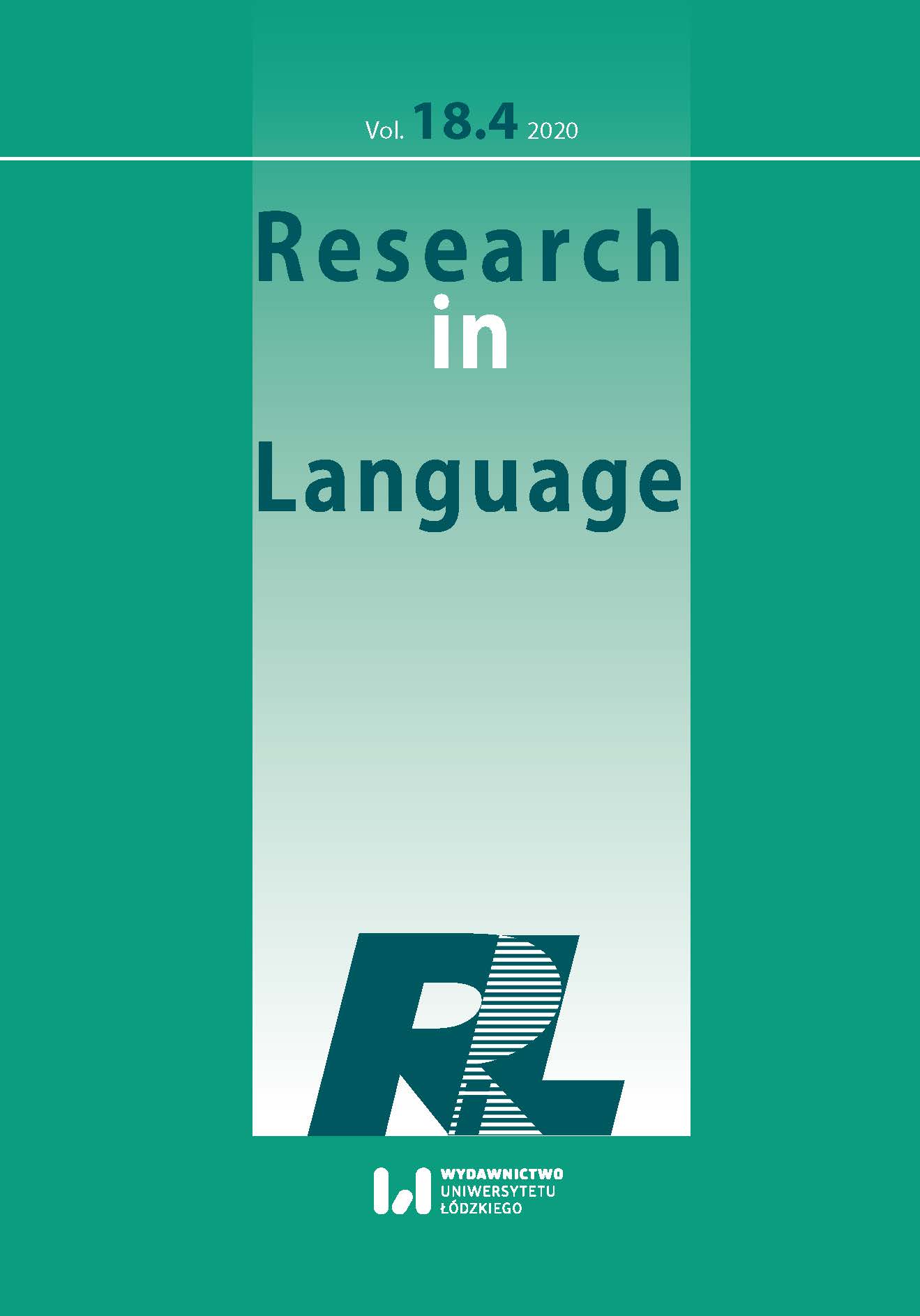Translation in Forming Musical Discourse: A Case Study of English-Language Song Lyrics in Russia
DOI:
https://doi.org/10.18778/1731-7533.18.4.03Keywords:
musical discourse, Russian English, sociolinguistics, song lyrics, translationAbstract
The paper considers translation as an intermediate stage in the creation of English-language song lyrics by native Russian speakers. Russian songwriters quite often rely on their native language and translate their thoughts from Russian into English. This leads to the use of a “russified” variety of English, which performs poetic and pragmatic functions and serves as a medium harmonizing content, sound, and music. Drawing evidence from 214 songs in various musical genres, as well as 10 ethnographic interviews with Russian songwriters, it examines the specific features of the Russian variety of English used in song lyrics, and discusses the main views on the authenticity of translation in song lyrics depending on the musical genre.
References
Adamu, A.U. 2010. The music’s journey: transcultural translators and the domestication of Hindi music in Hausa popular culture. Journal of African Cultural Studies 22(1). 41-56. https://doi.org/10.1080/13696810903488579
Google Scholar
DOI: https://doi.org/10.1080/13696810903488579
Aleshinskaya, E. 2013. Key components of musical discourse analysis. Research in Language 11(4). 423-444. https://doi.org/10.2478/rela-2013-0007
Google Scholar
DOI: https://doi.org/10.2478/rela-2013-0007
Aleshinskaya, E. 2016. Translation and meaning making: a critical study of a multilingual performance in “The Voice Russia”. Procedia – Social and Behavioral Sciences 231. 173-178. https://doi.org/10.1016/j.sbspro.2016.09.088
Google Scholar
DOI: https://doi.org/10.1016/j.sbspro.2016.09.088
Aleshinskaya, E. and E. Gritsenko. 2017. Language practices and language ideologies in the popular music TV show ‘The Voice Russia’. Language & Communication 52. 45-59. https://doi.org/10.1016/j.langcom.2016.08.005
Google Scholar
DOI: https://doi.org/10.1016/j.langcom.2016.08.005
Androutsopoulos, J. 2010. Multilingualism, ethnicity, and genre: the case of German hip-hop. In M. Terkourafi (ed.), Languages of Global Hip Hop, 19-44. London and New York: Continuum Press.
Google Scholar
Baxter, J. 2010. Discourse analytic approaches to text and talk. In Lia Litosseliti (ed.), Research Methods in Linguistics, 117-137. London, New York: Continuum.
Google Scholar
Blommaert, J. 2003. Commentary: a sociolinguistics of globalization. Journal of Sociolinguistics 7(4). 607-623. https://doi.org/10.1111/j.1467-9841.2003.00244.x
Google Scholar
DOI: https://doi.org/10.1111/j.1467-9841.2003.00244.x
Blommaert, J. 2010. The Sociolinguistics of Globalization. Cambridge, New York: Cambridge University Press. https://doi.org/10.1017/CBO9780511845307
Google Scholar
DOI: https://doi.org/10.1017/CBO9780511845307
Chik, A. 2010. Creative multilingualism in Hong Kong popular music. World Englishes 29(4). 508-522. https://doi.org/10.1111/j.1467-971X.2010.01678.x
Google Scholar
DOI: https://doi.org/10.1111/j.1467-971X.2010.01678.x
Crystal, D. 2003. English as a Global Language. Cambridge: Cambridge University Press.
Google Scholar
Davies, E. E. and A. Bentahila. 2008. Translation and code switching in the lyrics of bilingual popular songs. The Translator 14(2). 247-272. https://doi.org/10.1080/13556509.2008.10799258
Google Scholar
DOI: https://doi.org/10.1080/13556509.2008.10799258
Elmgrab, R. A. 2015. Authenticity and imitation in translating exposition: a corpus-based study. Journal of Educational Issues 1(1). 191-204. https://doi.org/10.5296/jei.v1i1.7781
Google Scholar
DOI: https://doi.org/10.5296/jei.v1i1.7781
Franzon, J. 2008. Choices in song translation: singability in print, subtitles and sung performance. The Translator 14(2). 373-399. https://doi.org/10.1080/13556509.2008.10799263
Google Scholar
DOI: https://doi.org/10.1080/13556509.2008.10799263
Gritsenko, E. and E. Aleshinskaya. 2015. Translanguaging in music: conceptualizing modes of interaction in global contact zones. Issues of Cognitive Linguistics 4(045). 73-80.
Google Scholar
Gritsenko, E. and E. Aleshinskaya. 2016. Translation of song lyrics as structure-related expressive device. Procedia – Social and Behavioral Sciences 231. 165-172. https://doi.org/10.1016/j.sbspro.2016.09.087
Google Scholar
DOI: https://doi.org/10.1016/j.sbspro.2016.09.087
Kachru, B. B. 1986. The Alchemy of English: the Spread, Functions, and Models of Non-native Englishes. Urbana, Illinois: University of Illinois Press.
Google Scholar
Low, P. 2008. Translating songs that rhyme. Perspectives: Studies in Translatology 16(1-2). 1-20. https://doi.org/10.1080/13670050802364437
Google Scholar
DOI: https://doi.org/10.1080/13670050802364437
Mattar, Y. 2009. Popular cultural cringe: language as signifier of authenticity and quality in the Singaporean popular music market. Popular Music 28(02). 179-195. https://doi.org/10.1017/S0261143009001779
Google Scholar
DOI: https://doi.org/10.1017/S0261143009001779
Proshina, Z. 2010. Slavic Englishes: Education or culture? In A. Kirkpatrick (ed.), The Routledge Handbook of World Englishes, 299-315. London, New York: Routledge.
Google Scholar
Proshina, Z. G. 2012. Dynamics of English development in its local varieties. ISLU’s Vestnik 2(18). 200-206.
Google Scholar
Schennikova, N. V. 2013. Russian idiom of the English language: some features of its grammatical system. Proceedings of Voronezh State University 1. 183-187.
Google Scholar
Ustinova, I. P. 2005. English in Russia. World Englishes 24(2). 239-251. https://doi.org/10.1111/j.1467-971X.2005.00407.x
Google Scholar
DOI: https://doi.org/10.1111/j.1467-971X.2005.00407.x
Downloads
Published
How to Cite
Issue
Section
License

This work is licensed under a Creative Commons Attribution-NonCommercial-NoDerivatives 4.0 International License.










